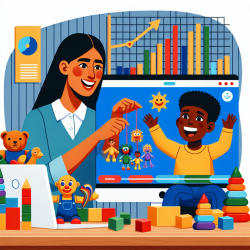Unlocking Potential: Enhancing Practitioner Skills Through Play Therapy
As a passionate advocate for creating great outcomes for children, I am excited to share insights from a pivotal research article on Play Therapy. This blog will delve into the findings of Gwen E. Chesters' study, originally published in the journal Mental Welfare in 1936. By implementing these research outcomes, practitioners can significantly improve their skills and enhance the therapeutic experiences for children.
Understanding the Essence of Play Therapy
Play Therapy is a therapeutic approach that uses play to help children express their feelings, thoughts, and experiences. According to Chesters (1936), play serves as a natural medium for children to communicate, allowing therapists to observe and understand their emotional and psychological states. This understanding is crucial for developing effective intervention strategies.
Key Findings from the Research
The research by Chesters (1936) highlights several important outcomes that practitioners can leverage:
- Non-Verbal Communication: Play Therapy provides a platform for children who may struggle with verbal expression. Through play, they can convey complex emotions and experiences without the need for words.
- Building Trust: The playful environment fosters a sense of safety and trust, which is essential for effective therapy. Children are more likely to open up and engage when they feel secure.
- Observational Insights: Therapists can gain valuable insights into a child's behavior, coping mechanisms, and emotional triggers through their play patterns.
- Emotional Regulation: Play Therapy helps children develop better emotional regulation skills by providing a safe space to explore and express their feelings.
Implementing Research Outcomes in Practice
For practitioners looking to enhance their skills, here are some practical steps based on the research findings:
Create a Safe and Inviting Environment
Ensure that your therapy space is welcoming and free from distractions. A comfortable setting encourages children to engage in play and feel secure. Use toys, art supplies, and other materials that are age-appropriate and culturally sensitive.
Observe and Interpret Play Patterns
Pay close attention to how children interact with the toys and materials. Look for recurring themes, behaviors, and emotional expressions. These observations can provide critical insights into the child's inner world and guide your therapeutic interventions.
Encourage Non-Verbal Expression
Recognize that not all children can articulate their feelings verbally. Encourage them to express themselves through play, drawing, or other creative activities. Validate their emotions and provide support as they navigate their experiences.
Build Trust and Rapport
Developing a strong therapeutic relationship is fundamental to the success of Play Therapy. Be patient, empathetic, and consistent in your interactions. Trust is built over time, and a positive relationship will enhance the therapeutic process.
Continuously Educate Yourself
Stay updated with the latest research and developments in Play Therapy. Engage in professional development opportunities, attend workshops, and participate in peer discussions. Continuous learning will help you refine your skills and stay informed about best practices.
Encouraging Further Research
While Chesters' research provides a solid foundation, the field of Play Therapy is continually evolving. I encourage practitioners to engage in further research to stay abreast of new findings and techniques. Conducting your own research or collaborating with colleagues can also contribute to the growing body of knowledge in this field.
To read the original research paper, please follow this link: Play Therapy.
By embracing the outcomes of this research and committing to continuous improvement, practitioners can unlock the full potential of Play Therapy and create transformative experiences for the children they serve.










